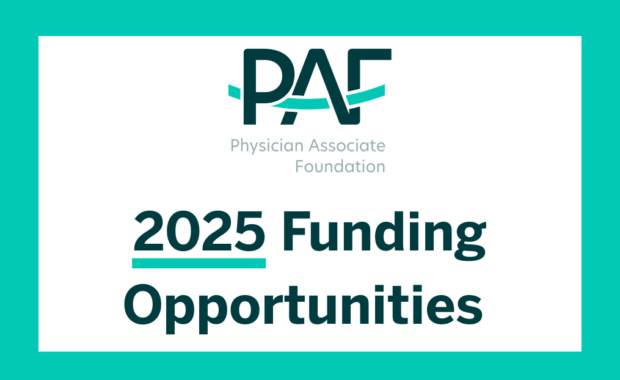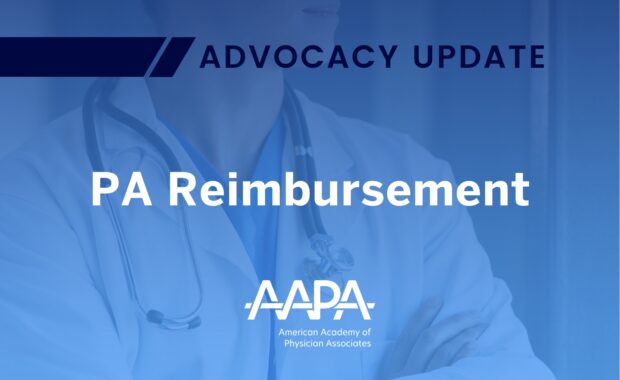Experts Address ‘Red Flags When Job Hunting’ and Other Questions
PA Recruiters Respond to Questions on Huddle Ask Me
September 24, 2021
Are you about to navigate the PA job market? In August, AAPA’s exclusive members-only community, Huddle, featured an Ask Me session with several experts who responded to job search questions from recent and soon-to-be graduates.

Janice Shipe-Spotloe, PA-C, DFAAPA, CPAAPA, is currently employed by West Virginia University Medicine as the director of Advanced Practice Professionals; she has more than 30 years of experience as a PA in healthcare. Michael Belkin, JD, FACHE, CMPE, is the divisional vice president of Merritt Hawkins, where he leads all recruitment for advanced practice providers (APPs). Merritt Hawkins is the nation’s leading recruitment firm for physicians and APPs.
Here’s a look at some of the insights Shipe-Spotloe and Belkin shared during the Ask Me session. AAPA members can go to Huddle to read the full session. (Responses have been edited for brevity.)
As a new grad, my impulse is to take the first job I’m offered. How can I strategically approach this process without deciding out of panic or fear?
Belkin: 1) come up with a list of “must-have’s” for your future position; 2) Determine the order of importance for the following: location, compensation, and quality of life; 3) Go on at least three interviews to get different perspectives on each of the roles/company cultures from each position.
Shipe-Spotloe: I conduct a lot of “open interviews” with candidates who are not sure what their interests are. I always ask, ‘From your rotations which were your favorites: medicine or surgery? Adult or pediatric? Inpatient or outpatient? Specialty expertise field or broad-based patient population?’ From there, if the first job you interview for offers you a position and it checks many of the boxes with benefits and salary in the median of the market, then you should accept.
What are some red flags for new grads when job hunting/interviewing? Second, what are some questions to ask in an interview to get a sense of the workplace culture?
Belkin: Regarding red flags, ask about recent turnover. It is important to know if there have been recent departures and the reasons behind the turnover. Ask the purpose of the search. Is this a new role due to growth or supporting new service lines? Is this to replace a provider who is retiring or leaving? This question will provide great insight into the motivation for the opening.
To get to workplace culture, some good questions to ask are: Take me through a typical day and week for providers. Who is performing similar roles? This can help identify if there is collaboration, quality of life or if providers work in silos without adequate time to recover. The turnover question will help identify culture. Another good question is to ask about the team culture.
[Find a list of questions to ask employers during an interview]
Shipe-Spotloe: Ask if the employer or group has hired PAs before. If not, ask why now. If they have hired or currently employed PAs, then I would ask specific questions regarding their utilization of PAs. A red flag would be if PAs report up strictly through nursing and not to physician leadership channels.
As a second year clinical PA student, when is the ideal time to start applying for jobs without being too early, but also wanting to have a job lined up prior to graduating?
Belkin: If there is a specific location where you really want to find a position, then start exploring and networking as soon as possible. If you are open, then begin your search at the beginning of your last year.
Shipe-Spotloe: I would begin the application process up to three months before graduation. Many employers are cognizant of “hiring season” in sync with graduation so they will expect you to be looking in this timeline.
[Keep your access to Huddle – join or renew today]
Any tips for when you are applying for a specialty area that you don’t have any previous experience in?
Belkin: If you have interest in a specific area, then look for an opportunity in a less desirable location. Highly desirable locations (beach, mountains, major metro cities) will have more candidates apply for those positions. Opportunities in smaller communities will have fewer interested candidates. Those employers will be more willing to hire an inexperienced candidate.
Shipe-Spotloe: When you interview for a specialty practice, tell the employer why you are interested in this subspecialty! Did you click with this organ system or the concepts of it in didactics? Did you have a particularly exciting rotation in this subspecialty that sparked the interest? Do you have a personal connection (family or loved one with an ailment you followed)?
What can students do to prepare themselves for the job search during clinical rotations?
Shipe-Spotloe: I like to see the individual skills you obtained from each rotations cataloged:
- Medicine rotations- what disease processes you managed and became proficient in; i.e COPD, work-up for STEM/non-STEM MI, diabetes, HTN, renal insufficiency, back pain, headache…etc.
- Surgical- numbers of first assist versus second assist in specific types of surgery (appy, Chole, Gyn, joint, hernia, etc)….whether you scrubbed in robotic cases vs lap vs open
- Procedural skills- laceration repair, casting/splinting, I&D, slit lamp exam, pelvic, lines, etc
- Interpretations-EKG, CXR, CT, MRI, ultrasound, EEG, etc.
Points of specific skills you developed should be logged for all then you can select sub-sets that pertain to specific applications/positions and provide details on them for interviewer.
As a 2nd year student quickly approaching graduation, are there any red flags, standard legal constructs, or terms and conditions in a job contract that you should look out for? As a new grad, how should we approach negotiating salary with our potential employer?
Belkin: When looking at an employment agreement be careful of any penalty clauses or claw back provisions. The U.S. is basically an employment “at-will” country. You should be able to walk away from an employment agreement as long as you provide adequate notice (30-90 days). You should not be penalized for terminating the employment agreement. If the employer pays you a signing bonus, that bonus may be contingent on some time of employment. For example, a signing bonus of $10,000 may require 1-2 years of employment. If the employee leaves earlier than the term, there may be a prorated payback requirement. This is standard. Paying back the entire amount regardless of time employed is not standard. Paying back any other fees is also not standard.
[Take advantage of Career Central’s Contract Negotiation page]
There should not be any penalty for less productivity (claw back provision) in the initial years of employment. For example, if the expectation is to see 20 patients per day for a certain salary but the employer can only schedule 18 patients per day, there should not be a reduction in compensation. After several years, there could be a portion of compensation based upon productivity. This should not begin in the first or even second year of employment.
Also be aware of the non-compete covenant. Many PA agreements do not have a non-compete. Those that do should be limited in time (1 year) and scope (geographical restrictions).
There are several national survey reports regarding compensation for a PA, including the 2021 AAPA Salary Report. This salary data will equip you with knowledge that you can use when negotiating compensation with a future employer.
You May Also Like
PA JobSource
How to Tailor Your Job Application for a Specialty Transition
How COVID-19 Impacted PA Salaries


